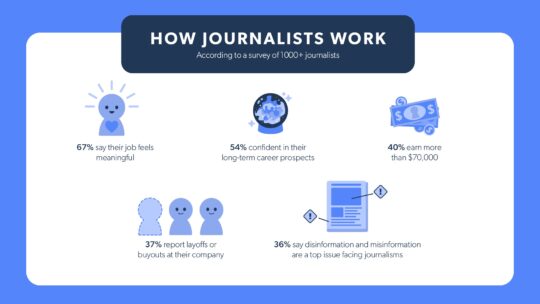
The ever-changing media environment magnifies the expectations, pressures and preferences of journalists. Muck Rack surveyed over 1,500 journalists to better understand what shapes their work today, and how PR professionals can more effectively collaborate with them for everyone's benefit. The findings serve as both a reality check and guide for better relationships and outcomes in media relations.
I presented these findings in Vancouver at the June 2025 International Association of Business Communicators (IABC) conference. And with the rise of Generative Engine Optimization (GEO), and the pressures for PR teams to power the news and offer credible sources, these tips are not just important, but timely.
Be Credible
More than a third (36%) of journalists cite disinformation as the most pressing issue they face, with politicization and lack of funding close behind. Reporters are fatigued by hype and skepticism, making credibility paramount. They want pitches grounded in reality—anchored by verified sources, third-party data, and credible SMEs (subject matter experts).
PR takeaway: Your CEO may not be your most credible or interesting source. Do some internal research to see who is working directly with a product, service or campaign, and see if they could be a credible expert.
Journalism is Meaningful, but Exhausting
While 67% of media say their work feels meaningful, nearly half also describe it as exhausting. Precarity, isolation, and lack of time compound these challenges. Only 20% of journalists say they consistently have enough time to do their job to standard.
PR takeaway: Your pitch is one of many. Make it count. Be clear, concise, and respectful of their time. Focus on real news, brevity and pre-vetted experts.
Trust Is Built on Consistency and Respect
Journalists remain cautiously optimistic about their careers, but they increasingly value long-term, professional relationships with PR counterparts. With 62% of journalists taking on more responsibilities beyond their core roles, they appreciate PR support that helps them scale, providing ready-to-use visuals, quotes and data points in advance.
PR takeaway: Reach out to journalist contacts when you don’t need anything from them. For example, you could tell a reporter you liked their latest piece, or comment on a social media post when you have something valuable to add.
Understand Their Constraints
More than half of journalists earn less than $70,000 annually, regardless of tenure. Many lack access to expensive research databases or gated content. Nearly 40% have experienced layoffs or buyouts in the past year—sensitivity and timing matter more than ever.
PR takeaway: If your pitch includes paid resources, offer summaries or PDFs. Help amplify their stories across your channels. Watch LinkedIn for layoff news.
The Social Media Shift
While social media is less critical for sourcing and story ideation, it remains vital for promotion. Facebook now leads as the most valuable platform for journalists, especially for community-centric stories. LinkedIn and Instagram continue to gain traction, while X is seeing declining trust and usage.
PR takeaway: Tailor your content to the platform. Thought leadership performs well on LinkedIn; Facebook favors consumer stories. Provide social-ready assets and amplify coverage across your owned and social channels. Avoid social media DMs unless specifically invited.
Self-Publishing Is On the Rise
One in three journalists now earns income from self-publishing outside traditional newsrooms. These journalists may be more open to affiliate or sponsorship relationships on independent platforms, but be sure to be transparent and upfront about terms.
PR takeaway: Independent journalists may have smaller audiences, but often they are paying and hyper-engaged, so don’t overlook the value.
Most Journalists Choose Their Own Stories
A whopping 92% of journalists either pitch or fully decide which stories they pursue. Half of journalists say their relationships with PR pros are vital to their success.
PR takeaway: Your pitch must inspire (not ask for) a story. Think of it as a collaborative opportunity, not a transaction.
The Perfect Pitch: What Works? (and What Doesn’t.)
- 62% of journalists prefer email pitches
- 69% prefer pitches under 200 words
- 78% want to receive pitches before noon
- 50% say one follow-up is fine, ideally three to seven days after the first email
What gets pitches deleted?
- 86% of journalists say irrelevance
- 71% say overly promotional tone
- 50% say it feels like a mass email
- 43% say it’s too long
- 33% cite missing or unverifiable sources
Linda Zebian is Vice President of Communications at Muck Rack.
